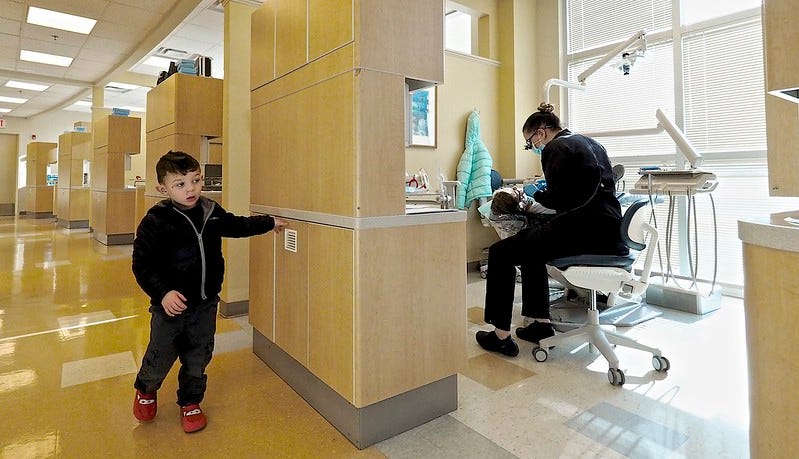OPINION: Goodbye, Moss
A local physician has experienced the joys of treating those who can't afford their care, and the crashing lows that come when the ability to continue that treatment suddenly ends.
By Dr. Joseph Ferguson
COMMENTATOR

Let’s first make this very clear: although I am a practicing local physician, I do not have any special access to information about Mary Washington or the Moss clinic. I am a disinterested party, and this article is nothing more than a detailing of my initial thoughts on learning about the tragic closing of the Moss clinic.
My very first reaction is: Wow. A lot of people are suddenly at risk of being without lifesaving care. There will be work-arounds but not all of those work-arounds are going to work.
Here’s another thought: a lot of people think that tax dollars going to free medical care is a bad thing and they call it “socialized healthcare.” But no one is thinking negatively of tax dollars going to fire departments putting out house fires for free and no one is calling those services “socialized fire care.”
I do have my own nonprofit story.
I come from a family ravaged by addiction, and I have a powerful passion for helping those suffering from addiction. I have recently brought on board at my clinic a nurse practitioner with a doctorate in psychiatric nursing practice who has deep competence and experience in helping those suffering from addiction.
In 2016, I began placing naltrexone implants in opioid addicts who were committed to getting and staying clean. Naltrexone has a chemical structure almost identical to that of naloxone, which is the active ingredient in Narcan, the nasal spray that first responders use to save the lives of those experiencing opioid overdose. The naltrexone implant lasted two months and, during that two months, if the addict used opioids, they would get no effect. The implant also drastically reduced cravings, so it made those first two months of sobriety not only doable but tolerable. It was a stunningly compassionate and effective treatment. Countless patients of mine did, in fact, get and stay clean. I will never know how many lives were actually saved by the care I gave, but I am certain that it was a very large number.
Finances became a problem. I wanted to charge money, but insurance companies were not paying for the implants and very few of my patients actually had any money. Many of them were unhoused. So I placed the vast majority of those implants for free. By 2019, the operation was becoming financially untenable. So I founded a nonprofit, New Freedom Clinic, and I put together a board of go-getters to go get money.
We received large donations from the Fredericksburg Baptist Church, the Fredericksburg Rotary Club, Spotsylvania County, and individuals. We got a very generous donation from Mary Washington Healthcare.
The nonprofit was thriving. I worked closely with each patient on a daily basis during the seven-day opioid withdrawal period leading up to implant placement and I kept in frequent contact with them long after the implant was placed. All of the implant recipients had my cell number. None of the patients were ever charged anything and no one was ever turned away. Lives were being saved.
But then we were dealt a death blow. In early 2023, both of the compounding pharmacies that made the implants suddenly stopped making them. And that was it. The whole purpose of the nonprofit was naltrexone implant placement. We had to shut down the whole operation.
I just found out that one of the compounding pharmacies is once again supplying the naltrexone implants, and I do plan to start placing them again, but I must admit: the whole idea of reconstructing New Freedom Clinic is very daunting for me. It’s sort of like you finished your novel then accidentally deleted it. You can and will reconstruct it, but….
I give all those details about New Freedom Clinic as a way of making a simple point: when a nonprofit shuts down, it’s not always because of incompetence or greed.
And that brings us back to the Moss clinic.
Here are some things that all happened within the same timeframe: Mary Washington starts a family practice residency program and makes public statements about committing to improving local healthcare. The relationship between Mary Washington and Moss is terminated. Moss is suddenly shut down.
The confluence of those events may be coincidental but it doesn’t look that way to me. Mary Washington is a nonprofit with a mandate to serve the greater Fredericksburg community. Maybe Mary Washington wants to expand access to free healthcare through its own hospitals and clinics, but if that is the case, I would like to see clear evidence that it is actually doing so.
Joseph Ferguson, MD, is a graduate of The John’s Hopkins School of Medicine. He founded Fredericksburg Primary Care 20 years ago and he has operated that clinic ever since. His office is accepting new patients at: 540.374.8140.
Support the Advance with an Annual Subscription or Make a One-time Donation
The Advance has developed a reputation for fearless journalism. Our team delivers well-researched local stories, detailed analysis of the events that are shaping our region, and a forum for robust, informed discussion about current issues.
We need your help to do this work, and there are two ways you can support this work.
Sign up for annual, renewable subscription.
Make a one-time donation of any amount.
Local Obituaries
To view local obituaries or to send a note to family and loved ones, please visit the link that follows.
This article is published under Creative Commons license CC BY-NC-ND. It can be distributed for noncommercial purposes and must include the following: “Published with permission by FXBG Advance.”











